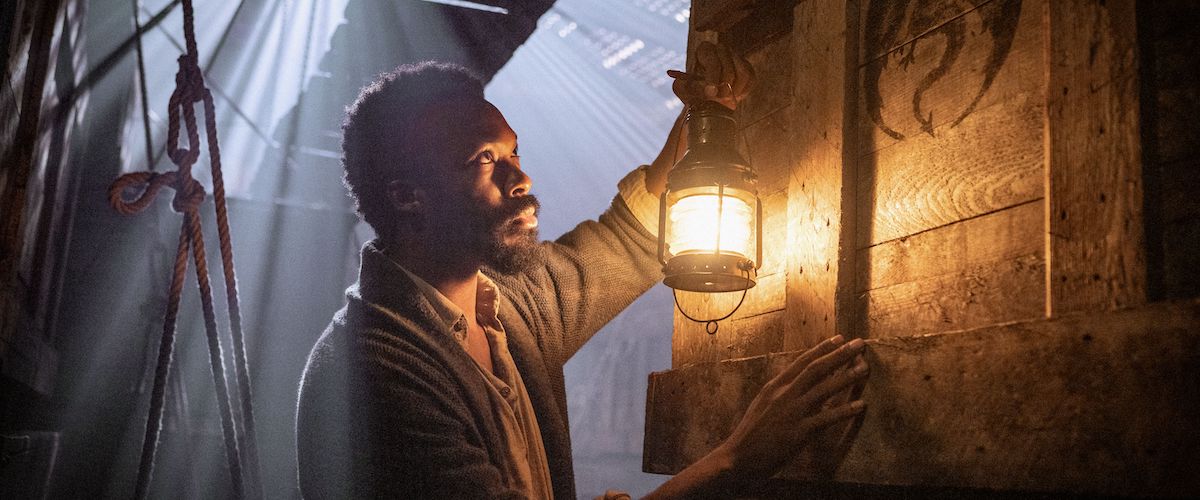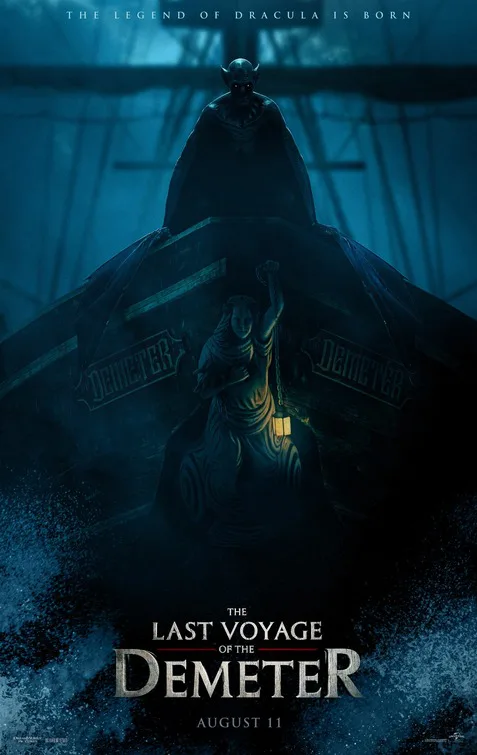As those of you with a decent grasp of horror trivia already know, the Demeter was the ship whose ultimately doomed journey to deliver some especially dangerous cargo from Transylvania to London was chronicled in the seventh chapter of the Bram Stoker classic Dracula. Although this section, running 16 pages in my copy, contains some of the most evocative imagery in that sometimes clumsily written book, the whole episode is not that important to the narrative. It simply illustrates how the title character got from point A to B, and on the rare occasions when filmmakers have chosen to bring this story to the screen, the journey is either reduced to a brief montage or newspaper headline or ignored entirely. Now comes “The Last Voyage of the Demeter,” a feature-length expansion of those 16 pages that fully examines the strange occurrences aboard one of the most doomed sea journeys in literary history.
Upon hearing this movie’s premise for the first time, I wasn’t entirely convinced it could work. This would be a film where practically every audience member would not only know exactly what the supernatural force at the center of the story is before the Universal logo hits the screen. But they would also—barring some unexpected deviation from the well-known narrative—know exactly how the on-screen events would play out. To me, it looked like just another attempt by Universal to introduce the character that played such a key role in the studio’s history to contemporary audiences following the misfired likes of “Dracula: Untold” and the recent and dreadful “Renfield.” That may have been the case, but the results are a big step up from those previous stumbles, an often striking take on the tale that makes up for what it lacks in surprise with a lot of style and some undeniably effective scare moments.
Set in 1897, the film opens as the Demeter is about to set sail from Transylvania to London, carrying Captain Eliot (Liam Cunningham), loyal first mate Wojchek (David Dastmalchian), his grandson Toby (Woody Norman), and a small crew that grows even smaller when some of the locals recruited for the journey get skittish when they see that the cargo contains many large crates being sent by an unknown figure to Carfax Abbey in London. Among those recruited at the last second is Clemens (Corey Hawkins), who signs on as the ship’s doctor to get passage home to England. His expertise comes in handy when one of the boxes is accidentally opened, and an apparent stowaway (Aisling Franciosi) is discovered with a mysterious malady that requires numerous blood transfusions.
Soon, strange things begin happening on the ship. All the livestock on board and Toby’s beloved dog are slaughtered throughout one grisly evening. Sailors begin seeing and hearing odd things at night while on watch, and even the ship’s rats appear to have vanished, leading up to the deathless line, “A boat without rats—such a thing is against nature.” The members of the crew soon begin disappearing, driving the already skittish ones who remain further into paranoia that is not helped when the stowaway, whose name proves to be Anna, finally wakes up and informs Clemens and the others that to steal a line from Mel Brooks, yes, they have Nosferatu. As Dracula (Javier Botet) continues snacking through the ship, the rapidly dwindling survivors try to figure out how to stop him before they reach London.
The film was directed by André Øvredal, whose previous credits include such intriguing horror-related efforts as “Trollhunter,” “The Autopsy of Jane Doe,” and the underrated “Scary Stories to Tell in the Dark.” This time, he is trying to figure out how to tell a story in which everyone in the audience will be ahead of the characters on the screen at virtually every given point. He accomplishes that primarily by focusing heavily on visual style, creating a moody and haunted atmosphere throughout—even during the scenes set in the daytime—that is both eerily beautiful and just plain eerie. “The Last Voyage of the Demeter” is one of the better-looking horror films to come along in a while. The cat-and-mouse games between Dracula and the crew are staged in a manner that suggests a seafaring variation of “Alien,” with Øvredal milking scenes for maximum tension before culminating in some nasty business.
Bear in mind, some of that business is indeed quite nasty—the visualization of Dracula shown here is a particularly grotesque and demonic variation, the scenes of slaughter are definitely gory enough to earn the “R” rating, and not only does the one character you are conditioned to expect to somehow avoid a gruesome demise end up suffering just that, but they also do so more than once. The performances, especially the ones from genre MVP Dastmalchian, Franciosi (so effective in “The Nightingale”), and Botet, are all strong and convincing, which helps to raise the emotional stakes to make up for the lack of surprise.
There are two points where the film stumbles a bit. Although the relatively slow and measured pacing employed by Øvredal to generate suspense is mostly effective and preferable to the quick-cut approach others might have taken, a few scenes here run on too long for their own good. Also, the film—Spoiler Alert!—indulges in one of the most irritating elements of contemporary horror cinema, a final scene that exists solely to set up future movies if this one does well at the box office.
And yet, the rest of the movie works enough so that these flaws don’t hurt things too badly. “The Last Voyage of the Demeter” may not be a classic in the annals of Dracula cinema along the lines of the Terence Fisher’s Hammer production “Horror of Dracula,” Werner Herzog’s version of “Nosferatu the Vampyre,” or Francis Ford Coppola’s “Bram’s Stoker’s Dracula.” But it is a smart, well-made, and sometimes downright creepy take on the tale that both horror buffs and regular moviegoers can appreciate in equal measure.
In theaters now.




















